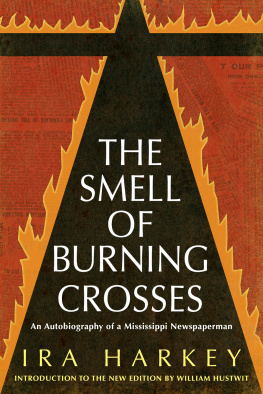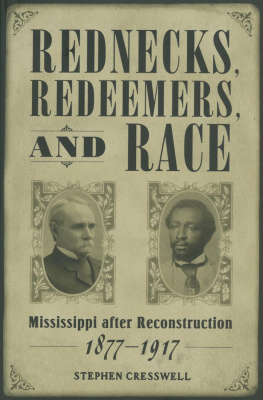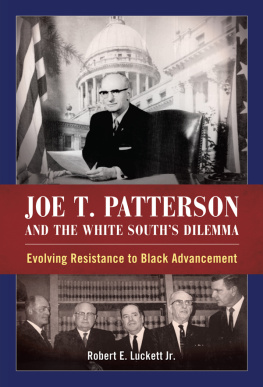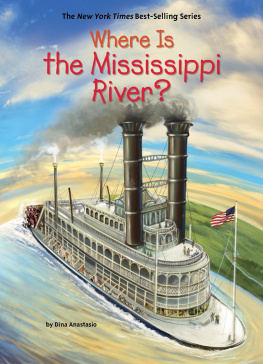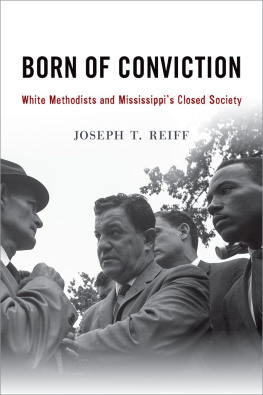Mississippi: The Closed Society
MISSISSIPPI The Closed Society
James W. Silver

For three native Mississippians
Bill, Betty, and Gail
www.upress.state.ms.us
The University Press of Mississippi is a member of the Association of American
University Presses.
Copyright 1964, 1966 by James W. Silver
Reprinted by special arrangement with Houghton Mifflin Harcourt Publishing
Company
All rights reserved
Manufactured in the United States of America
First University Press of Mississippi printing 2012
Library of Congress Cataloging-in-Publication Data
Silver, James W. (James Wesley), 1907-1988.
Mississippi: the closed society / James W. Silver.
p. cm.
Originally published: New York: Harcourt, Brace & World, 1966.
Includes index.
ISBN 978-1-61703-312-4 (pbk.) ISBN 978-1-61703-313-1 (ebook)
1. MississippiRace relations. 2. MississippiPolitics and
government1951- I. Title.
F345.S5 2012
976.2dc23 2011052022
British Library Cataloging-in-Publication Data available
A Note from the Author
From the White House at eight oclock on the night of September 30, 1962, John F. Kennedy began to plead eloquently with Mississippi students to understand that they must not interfere with the court-ordered admission of Negro James Howard Meredith to their University. Unknown to the President, at almost exactly the moment his sober face appeared on television screens across the nation, tear gas was being fired by United States marshals into an unruly crowd in front of the Lyceum Building on the Ole Miss campus. Choking and gasping, the spectators fell back across the Circle toward the Confederate monument, pursued by the marshals as far as the flag pole.
Within ten minutes, five or six green army sedans, each carrying six white-helmeted marshals, came over the Illinois Central bridge, which spans Hilgard Cut between the campus and the town of Oxford, and moved toward the Lyceum. As they made the slow turn to the right at the Confederate monument, they were assaulted with a hail of bricks thrown at close range. Windshields and car windows were smashed. My wife and I could see the men inside huddling to protect themselves from the splintering glass. The pounding of the bricks on the cars and the screamsThe sons of bitches have killed a coed. Well kill the bastards. Well get the God-damned marshals! these, plus shrill cries of filth and obscenity, proved that eighteen- and nineteen-year-old students had suddenly been turned into wild animals.
My wife and I suspected then that we were in for a night of terror. Earlier in the afternoon, warned by our nine-year-old daughter Gail, who had heard the news over the radio, we had driven out to the airport to watch the arrival of the marshals and Justice Department officials, little dreaming of the agony in store for us. As our University-owned home is only a half mile from the administration building (Lyceum), which had been requisitioned for federal headquarters, we could not have avoided the excitement had we wished to do so. In front of that majestic ante-bellum structure, both of us did what little we could to help maintain the calm that prevailed until after six oclock, partly by carrying to those assembled the Chancellors message that the marshals and the Mississippi Highway Patrol were acting in concert to keep order. Governor Ross Barnett had finally capitulated to federal authority; had, in fact, selected Sunday for the admission of Merediththat was the word.
The hour before eight was filled with apprehension and foreboding as demonstrations and violence increased, and once the tear gas was fired we moved slowly back, comfortably out of range, past the flag pole to the old Science Building. When the army cars came by, we were sitting on the edge of the Cardinal Club memorial; I was nursing a couple of cracked-open knees, having been accidentally tripped and knocked to the concrete crosswalk by a large Confederate flagstaff carried by a young man in more of a hurry than we. Already the students were yelling about regrouping to attack and about keeping up the attack on the marshals until their ammunition ran out.
It is not my purpose to recount the frightening events of that unbelievable night of passion and fury. Separated more often than not, my wife and I were once more together between two and three oclock in the morning of October first, at the side of the Chancellors house, facing the Grove. Two contingents of federal troops, about a hundred men in each, newly arrived from the airport, marched by in full battle dress. As they turned the Circle, away from the pre-Civil War Y building and toward the Fine Arts Center, these American soldiers were assailed with fire bombs. We saw two sheets of flame about the size of our small house fall among the troops. They hardly got out of step. Only a miracle kept any number from catching on fire. Their colonel later said that if a single man had been seriously burned, both squads would have wheeled and turned their guns on the rioters in the smoke-filled Circle. By this time the student insurrectionists were far outnumbered by other Mississippians, to whom had been added a few unsavory out-of-state volunteers.
There were other occasions that night when a tragic event lacked only a hair of expanding into a holocaustwhen, for instance, the marshals supply of tear gas was twice almost miraculously saved from exhaustion by a daring truck driver who ran gauntlets of stones and gasoline-fueled fire. Disciplined as they proved themselves to be, the marshals would not have submitted to savage personal beatings without resorting to their firearms.
As it was, the manly bearing of the hastily gathered marshals fighting for their lives and the exemplary conduct of the Mississippi National Guardsmen and the regular soldiers are matters for great American pride. Like many observers, I was alternately enraged and heartsick that my fellow Mississippians, particularly the students, felt called upon to engage in a mad insurrection against their own government. To me it was and still is nothing less than incredible. Later, when the state of Mississippi was being flooded from within by malignant propaganda about what had happened at Ole Miss that fateful night, I felt a growing compulsion to try to tell the truth, to relate in plain fashion what had taken place, and then to put it all in historical perspective. For more than a year and a half this has been in my mind and in my heartmy wife says that I am obsessed with the subject. The result of my thought and study and research is in this book.
I have tried to approach an intensely emotional subject without sentimentality. I am no longer angry with anyone. I have found it necessary to criticize the conduct of certain individuals, some of whom have been my friends. While names have been kept to a minimum and language has been restrained, and while nothing has been put down in malice, I am quite sure that the feelings of some will be hurt by these pages. I will be deeply sorry for such an outcome, but the need for telling the story is greater than the importance of protecting personal feelings, whether those of fellow Mississippians or my own.
It has been suggested to me by well-meaning people that we ought to forget the recent nightmare, to put it in the past where bad dreams belong. And go on from there. The sad truth is that within minutes of the start of the insurrection such a course became impossible for me. For what was happening was distorted with passionate and deliberate speed and was made into the inspiration for some future insanity, an insanity just as inevitable as the bloodshed at Ole Miss. The point is that when people are told from every public rostrum in the state on every day of their livesand such is the case with the undergraduates who assaulted the marshalsthat no authority on earth can legally or morally require any change in the traditional terms of Mississippi social life, this very process generates conditions that will explode into riot and insurrection.
Next page

